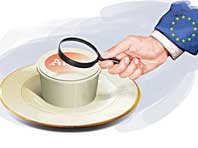
Business Standard | Feb 10, 2012
No exotic cheese names for Amul if India accepts EU demand
Joe C Mathew / New Delhi
Amul, the country’s best-known milk products maker, may have to soon erase several exotic words such as Gouda and Emmental from its cheese labels, if the European Union (EU) succeeds in its demands made to India as part of ongoing negotiations between the two sides on free trade agreement (FTA).
The same will be the fate of Feta, Parmesan and Mascarpone, the popular brands sold by Kodai Dairy, a family-owned dairy in Kodaikanal, a well known hill station in down-country Tamil Nadu.
All this will happen if India accepts an EU demand for high-level geographical indication (GI) protection for about 130 products that fall in the agriculture, wine and spirit categories. GI of goods in simple terms means that a particular name or a brand conveys an assurance of quality and distinctiveness essentially attributable to a specific locality, region or country.
As such, quite a few may have to withdraw their brands. They include Delhi-based Flanders Dairy Products that specialises in Indian versions of European cheese, La Ferme, the branded milk product company of the citizens of Auroville in Pondicherry, and dozens of small and big dairy product manufacturers spread across the country.
According to government officials, GI protection in its normal sense secures the particular indication from being used by others. For example, ‘basmati’ in basmati rice or ‘Darjeeling’ in Darjeeling tea. However, products which say ‘rice that resembles basmati rice’ may get through. If there is nod to high level of protection as sought by EU, even such references may prove to be a GI violation.
Thus, Indian dairy product companies that have been marketing milk products under brands or names that have its origin in Europe will have to be withdrawn if India agrees to EU position.
For instance, as Kodai Dairy’s website itself claims that the company makes local versions of international cheese brands such as the Dutch Gouda, French Camembert and Italian Parmesan by using “FDS (freeze dried starter) culture and other materials imported from Australia and France”.
Similarly, Amul Emmental Cheese or the “cheese with the hole” is Amul’s version of Swiss cheese that owes its name to the Emmental valley, near Berne in Switzerland.
The total market size of the milk derived products in India is estimated at Rs 1 lakh crore, within which cheese as a category is approximated at Rs 500 crore.
However, national players like Amul have objected to this, saying the demand is unrealistic and illogical. Amul has already submitted its protest to the government 10 days ago. Its MD, R S Sodhi wondered why Europe could not allow Indian products to enter their market even if his company paid required duties — and when India could allow European milk products to enter the country. “There should be a level playing field for all the competitors. Actually, the European market is not growing for quite some time. This is why they are looking for markets outside. Their demand is actually hilarious.”
Sodhi also maintained that ‘Gouda’ and ‘Emmental’ cheese plants were set up in India with the help of the Swiss government. It was later that they were given to Amul. Now it makes “no sense” for them to ask for such protection. “In Europe, even local people and shopkeepers make ‘paneer’, which traces its origin from India. That should also be banned. One can easily find yogurt drinks in Switzerland served under brand name ‘lassi’ which is again an Indian product,” he said. “Then how can they claim Indian players to withdraw their brands which trace their origin from Europe?”
The European Union (EU), anticipating a huge market opportunity once the comprehensive free trade agreement being negotiated is ratified, has sought GI protection for 130 products. Scotch Whisky, Napa Valley, Champagne, Cognac and Peruvian Pisco are the foreign GIs that have already received registration in India.
In addition to cheese, brands in product categories such as olive oil, ham, vinegar, lavender oil and dried cookies plums also figure in the list of 130 products. According to officials, the GI applications from EU member-countries are mostly in the category of beverages such as beer and wine brands, processed meat and milk products, and various bakery items, including biscuits and pastries.
Italy, France and Germany are among the leading applicants.
India’s GI registration office has registered a total of 158 GIs between 2003 and 2011, including Darjeeling Tea and Mysore Silk.
The 12th EU-India Summit, which begins here tomorrow, will take stock of the progress so far in negotiations between both the sides on FTA. It would also discuss other bilateral issues concerning economic cooperation between India and the EU, besides climate change, energy and science and technology.